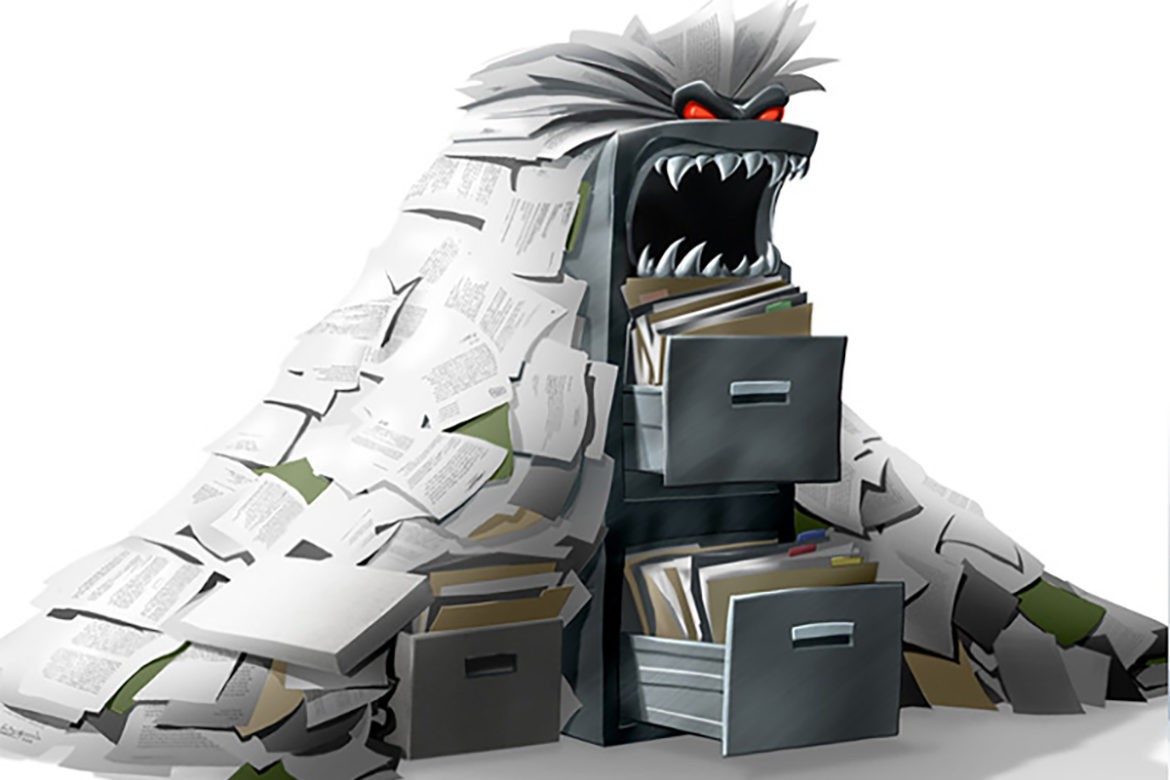
The Wonderful World of Paperless and Other Unicorns
Your bank wants you to go paperless.
It will plant a tree in your name, it will cut your fees, it will donate to environmental causes – all you have to do is click right here.
Paperless transactions save financial institutions lots of money. Plus, think of the trees!
And for the consumer at home, you save money on expensive ink, and space previously devoted to filing cabinets.
It’s a win-win for everybody. Or is it? Let’s take a look.
Environmental Impact
With no need to buy reams of paper and expensive ink, a paperless world appears to be a big win for the environment. Ink requires harmful solvents in its manufacture, and ink cartridges made of plastic contribute to landfills, unless you refill your ink cartridges.
But we need to store the data somewhere. More electronic data means more computers. It also means more scanners, shredders, and backup hard drives to support the paperless world. Not everyone recycles electronics responsibly, so all this means more electronics in landfills and more e-waste export to other countries when those electronics eventually expire.
The manufacture of computers also requires mining the earth for minerals (66 different minerals according to the website mine-engineer.com), not to mention the energy and emissions used in shipping them from overseas factories to our shores.
So while your paper files might be destroyed in a flood or fire, paper also:
- Easily outlives a hard drive
- Is a renewable resource
- Is much easier to recycle than electronics
This isn’t an argument against going paperless, and I can’t say who the real winners and losers are when it comes to the environmental impact of this trend. Just be aware that it’s a lot more complicated than you might think. And don’t let a heavy “green” marketing campaign tempt you into buying a $400 desktop scanner, which is likely more than you need for basic home use.
Security Risk
While going paperless reduces the risk of identity theft from paper trash, it increases the risk of identity theft from online sources.
What does in-house tech support and network security expert say?
A paperless system leaves us more vulnerable to identity theft, not less. And the more personal information stored on your computer, the higher the consequences if your computer or data are physically stolen or hacked remotely. – Richard Sand
Rich will be helping me write about data security for the home office, so stay tuned to learn how to best protect yourself.
Longevity Risk
My checking account statements are only available online for six months. I’ve got to remember to download them to my home computer while they are available.
If I forget and need to retrieve a statement older than that, it’s a phone call to the bank and a $5 fee. Unless you are diligent about regularly downloading statements, you may have trouble finding information when you need it.
Auto-Pilot Risk
If you’re like me, paper reminders help get the bills paid on time. An electronic bill can get lost in my overflowing inbox, or end up in the spam filter. Or I simply change my email address and forget to update the various financial institutions I do business with.
Automation is great until something goes wrong. For example, if you’ve got auto-pay set for a certain amount, and fall out of habit of reviewing your statements because you’ve gone paperless, the amount you owe could change and you might miss it.
The Bottom Line
Driven by cost savings, printed statements from your bank, credit card company, and other financial institutions will eventually be a thing of the past.
- The responsibility for document asset management will continue to be pushed onto the consumer.
- Consumers need to be diligent about downloading statements regularly.
- Fees for retrieving historical records will increase.
- Vulnerability to identity theft from paper trash may decrease, while increasing for theft from online information.
- The consequences of your personal computer being vulnerable to the risks of theft, viruses, malware, hackers, and other threats also increase.
All this means that in a paperless world, safe data security and backup systems are essential. These procedures cost time and money, but they are a fact of modern life and you should be doing them anyway – especially if you have priceless family photos and home movies on your computer like me.
And while it’s unclear who wins in the environment department, as you transition to paperless you can do your part by recycling old electronics responsibly and refilling ink cartridges when you do print.

John Murphy
11/30/2011 at 9:36 amHi Sammy,
I find your writing informative and clever and insightful. I enjoy the perspective on topics of which I have little knowledge.
You write like your are: cute and witty and intelligent.
Nice plug for Richard Sand and Associates.
The site looks great. Dig it all.
Your Friend.
John
Samantha
12/03/2011 at 11:44 pmThanks John! Thanks for writing in and our best to you as always 🙂